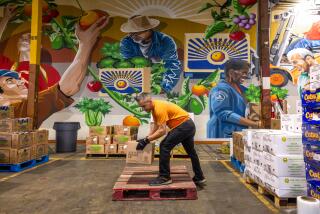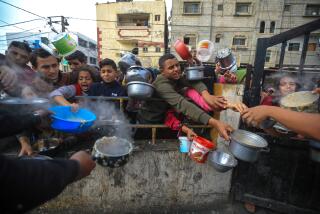By the Thousands, City Folk Turn Out to Grub in Soviet Mud for Precious Potatoes : Food shortage: Families respond to government appeal to help with the harvest and prevent a shortage.
- Share via
PERVOMAISKY, Soviet Union — A director of a medical laboratory and her 10-year-old son crouched down over a field and dug potatoes out of 4-inch-deep, chocolate-colored mud as her physicist husband turned the wet soil with a spade.
“We were afraid that the food shortage might be very, very severe and we might starve this winter,” Lyubov Smakovsky, 39, said as she dropped potatoes into a metal bucket. “So, we decided to spend all day Saturday and Sunday gathering potatoes. We should have enough for our large family for the whole winter.”
Although the Smakovskys dug the potatoes up with their own hands and paid the same price they would at a grocery store, the scientist couple felt this guaranteed food for their family.
“Potatoes have already disappeared from stores in Moscow,” Yura Smakovsky, 42, said. “But I never thought I’d end up digging my own potatoes.”
The Smakovskys were among the tens of thousands of city folks who responded to a government appeal to help with the harvest and prevent a shortage of potatoes, a staple of the Soviet diet.
The potato crop itself was good, but there has been so much rain that potatoes are rotting in several inches of mud and water. The machinery that usually harvests the potatoes is useless because it gets stuck in the muck. Workers at Pervomaisky State Farm, about 25 miles south of Moscow on the road to Kiev, were able to harvest only about a third of what the government expected from them, according to Alla A. Isayeva, 48, an accountant at the farm.
Even after thousands of city dwellers dig their own potatoes for about 20 cents a pound, perhaps 40% of the potatoes will remain in the ground.
“We haven’t had a harvest as bad as this in the 25 years I have worked here,” Isayeva said. “It’s not just because of the rain. The harvest was not well-organized like it has always been in the past.”
Across the Soviet Union, only three-fifths of the potato crop has been harvested, according to a report this week on Vremya, the evening news program on state television.
The Pervomaisky State Farm potato crop is a microcosm of the breakdown of the whole Soviet economy.
For decades, production was controlled by strict plans set by government officials. Wages were docked when targets were not met. That centralized planning system is deteriorating quickly, but the market forces of supply and demand, which Soviet leaders are depending on to supplant the old system, have not yet taken hold.
In the case of potatoes, groups of students, workers and soldiers were traditionally sent to the fields to dig as “volunteers”--and practically no one dared refuse. But this year, the potato brigades were poorly organized, and many people balked at giving their hard labor to the government for free.
The bad weather, rain almost every day since mid-August, added to the critical situation.
Isayeva complained that her compatriots have lost the socialist ideal of toiling for the good of the whole, instead of worrying only about themselves.
The state farm tried to persuade people to gather four sacks of potatoes for the farm and one for themselves, but people complained and said they would rather pay the state price for potatoes than give the fruits of their labor to the government.
“We will see the disintegration of the economy this winter when there are no potatoes in the stores,” Isayeva said. “People don’t even hope the government will supply them with food this winter.”
A 21-year-old engineering student and several friends came to Pervomaisky from the city in a van to make sure they would not go hungry if the country runs out of its favorite side dish.
“In my opinion, the potato shortage is sabotage,” Sasha Popov said. “First it was cigarettes, now it’s potatoes--it’s to someone’s advantage that the system appears to be totally breaking down.
“It was no secret that the weather was bad,” Popov added. “The harvest should have been started earlier.”
In recent days, with less than 10% of the half-million tons of potatoes that Moscow will need over the winter harvested, the government proclaimed a state of emergency so that factory and office workers could be drafted to help dig. Members and staff workers of the Moscow City Council also went into the fields to dig potatoes last weekend, but they refrained from taking potatoes home with them.
“We had a discussion here in the field and agreed not to take the potatoes,” Deputy Mayor Sergei B. Stankevich told state television in an interview from Dmitrovsky State Farm. “We want to demonstrate that we can count on supplies in the stores and expect no catastrophes or disasters. I can tell you with full certainty that this will not happen. It will be difficult, but there is not grounds for panicky statements about an approaching famine.”
The potato crop is not the only winter vegetable crop in jeopardy--harvests of carrots, beets, cabbage and onions are also behind schedule.
In another field at Pervomaisky, about 20 soldiers, most of them from the Central Asian republic of Uzbekistan, were harvesting beets with little enthusiasm.
“We don’t know anything about harvesting beets,” Ogil Akhmadoliev, 19, one of the Uzbeks, said. “We’re soldiers.
“We’re cold and wet, and we don’t want to work,” he added.
But Ibragimov Asamudin, a soldier who had returned home from East Germany the day it was united with West Germany, was more eager.
“Of course, we all need to pitch in to help with the harvest,” Asamudin, 22, of the southern Soviet region of Dagestan, said. “Our country needs us.”
Back at the potato field, Maria, a 62-year-old Muscovite who refused to give her last name, glanced at the thousands of small or half-rotten potatoes that had been discarded or overlooked by previous potato pickers. Then, she turned over a large clump of mud with her shovel to reveal several large, healthy potatoes.
“Look at all these potatoes--these are wonderful, delicious potatoes,” she said. “It’s such a shame. It’s such a shame. I’m so sorry that all these potatoes are just going to waste.”
More to Read
Sign up for Essential California
The most important California stories and recommendations in your inbox every morning.
You may occasionally receive promotional content from the Los Angeles Times.










